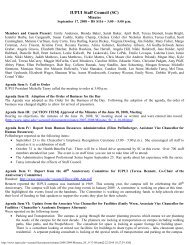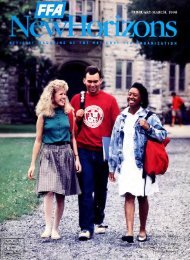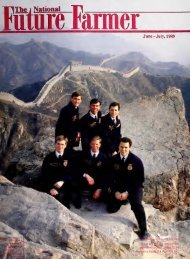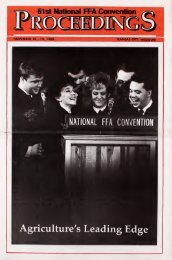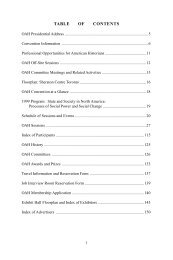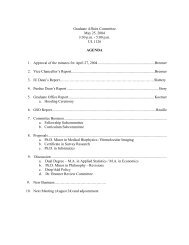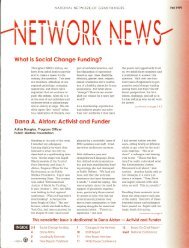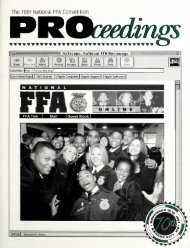National Future Farmer
National Future Farmer
National Future Farmer
You also want an ePaper? Increase the reach of your titles
YUMPU automatically turns print PDFs into web optimized ePapers that Google loves.
By Andrew Markwart<br />
The Secrets of Science<br />
STEVE McKay gets his students excited<br />
about science. They're excited about<br />
cloning plants, testing new horticulture<br />
products and engineering better ways to<br />
grow food.<br />
This is no easy feat, considering a large<br />
share of his students at Anderson Valley<br />
High School in Boonville, California,<br />
come from low income and foster homes.<br />
Most of the kids in foster homes live<br />
there after they've been in juvenile deten-<br />
tion or come off the street.<br />
What's his secret? He gets students<br />
involved in a money-making project on<br />
the school's 7-acre land laboratory, then<br />
shows where an application of science<br />
can turn into more profit for them.<br />
"What I've noticed about students lately<br />
is that money seems to be a big motivating<br />
factor," said McKay. "By getting a<br />
return from working on projects on the<br />
school farm, they see that science might<br />
be a way to increase their profits."<br />
"We have a 50-50 arrangement where<br />
the students actually sign up and take<br />
ownership in one of the projects on the<br />
farm. They get 50 percent of the profits<br />
and the other 50 percent goes back to the<br />
school.<br />
McKay lets his students focus on areas<br />
that interest them. "What I've tried to do<br />
is set up a mini-agricultural community,<br />
where those students who are really good<br />
in science, for instance, will be leading<br />
the science projects," he explains. "Those<br />
students who like to make money are in<br />
charge of managing the farm and those<br />
students that just have fun working outside<br />
on projects, that's where they can<br />
start out."<br />
Class Experiments<br />
The list of projects McKay's students<br />
work on sounds like it belongs to a uni-<br />
versity's agriculture experiment station<br />
rather than a small-town high school ag<br />
department. Most impressive is the exten-<br />
sive plant tissue culture lab (seen on the<br />
cover) where everything from tomato to<br />
gooseberry plants are cloned from single<br />
cells in a germ-free environment.<br />
His classes are also experimenting<br />
with kiwi fruit, which are not widely<br />
10<br />
Students are fired-up and having fun. His classroom<br />
is the center of attention at Anderson Valley and the<br />
school administration couldn't be happier.<br />
Can this be vocational agriculture?<br />
students start with basic science experiments such as this insulator quality test. The<br />
glass jars are covered with different kinds of insulators and the interior temperature is<br />
observed using thermometers.<br />
grown in the U.S., but are of special<br />
interest to McKay. Much of his master's<br />
of science degree from the University of<br />
California— Davis was based on kiwi<br />
pollination.<br />
McKay found that bees don't normally<br />
like to switch between male and<br />
female kiwi plants, which is crucial for<br />
pollination to occur. Tlie class has built a<br />
trellis that has a male variety growing on<br />
a wire slightly above a female plant. As a<br />
result, the pollination rate is drastically<br />
increased, kiwi production is higher,<br />
profits are higher—and all because of<br />
some applied science.<br />
The school's greenhouse is a laboratory<br />
within itself Heat sensors have been<br />
placed in the root zones of bedded plants<br />
to show that keeping the roots warm and<br />
lowering the air temperature will save<br />
energy costs. They are also testing different<br />
kinds of insulations under the plant<br />
beds to see which is most efficient at<br />
retaining heat.<br />
McKay believes cooperative science<br />
projects with the agricultural industry<br />
are important. McCalis Grower Supply,<br />
a major west-coast greenhouse supplier,<br />
has contracted McKay and his crew to<br />
do product testing for them. "They want<br />
to test polyfilm on the tops of our greenhouses,"<br />
says McKay. "We've got sen-<br />
sors that can sense the amount of insula-<br />
tion both inside and outside of the<br />
greenhouse. We'll see how much light<br />
actually is transmitted, how long the<br />
plastic lasts and how well it performs. All<br />
sensors are linked to an Apple He computer<br />
in the classroom for constant monitoring<br />
and data storage.<br />
The Northrup King seed company is<br />
working with the class to determine<br />
which tomatoes are best suited for that<br />
particular growing area of California. A<br />
local winery has also contracted the class<br />
to grow grapes for them.<br />
Times have not always been so positive<br />
at Anderson Valley High School.<br />
The <strong>National</strong> FUTURE FA RMER




